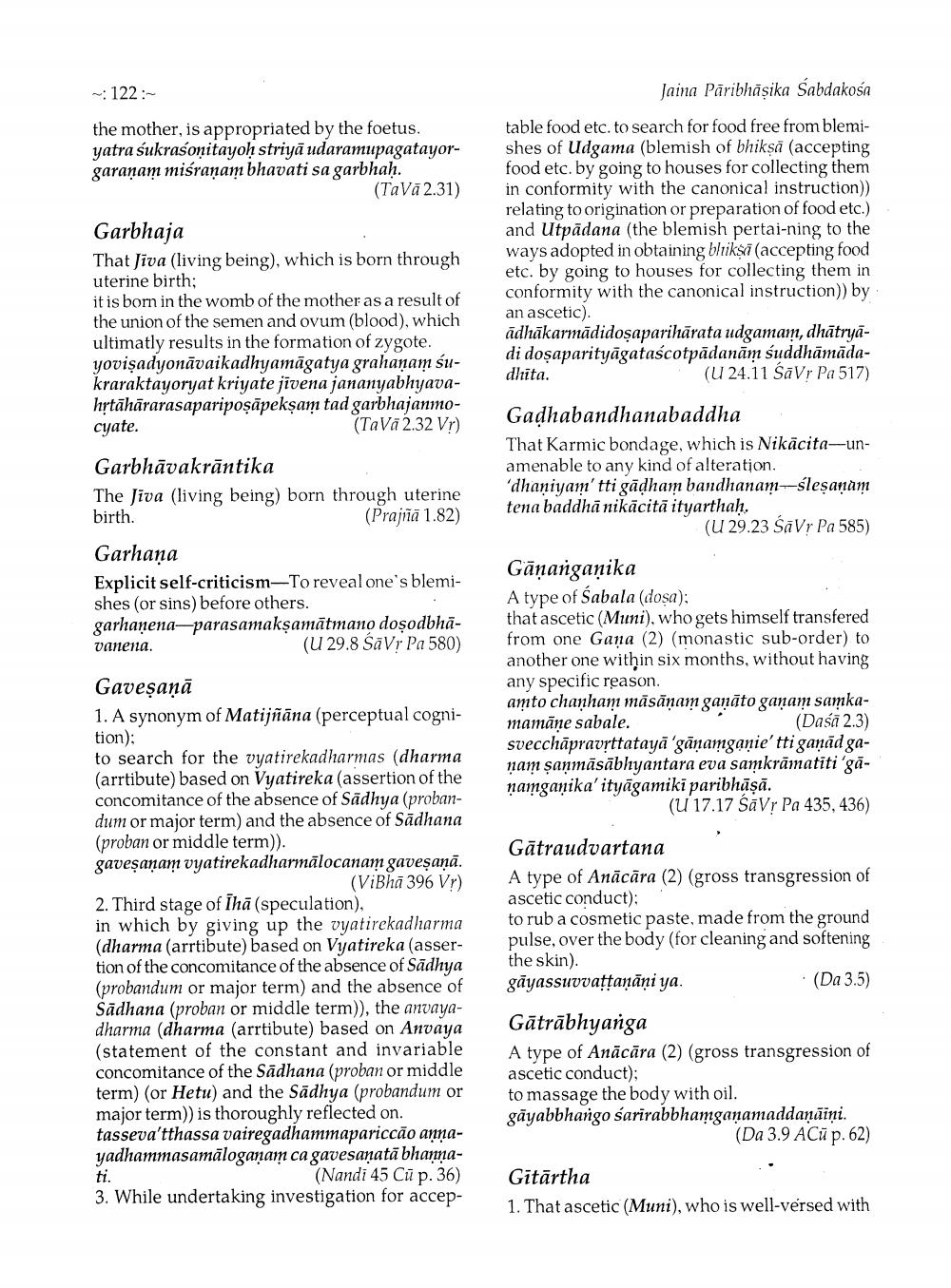________________
~:122~
the mother, is appropriated by the foetus. yatra sukrasonitayoh striya udaramupagatayorgaranam misranam bhavati sa garbhah
(Tavā 2.31)
Garbhaja
That Jiva (living being), which is born through uterine birth;
it is born in the womb of the mother as a result of the union of the semen and ovum (blood), which ultimatly results in the formation of zygote. yoviṣadyonävaikadhyamägatya grahaṇam śukraraktayoryat kriyate jivena jananyabhyavahṛtähärarasaparipoṣāpekṣam tad garbhajanmo(Tavā 2.32 Vṛ)
cyate.
Garbhavakrantika
The Jiva (living being) born through uterine birth. (Prajila 1.82)
Garhana
Explicit self-criticism-To reveal one's blemishes (or sins) before others. garhanena parasamakṣamatmano doṣodbha(U 29.8 ŠāVT Pa 580)
vanena.
Gaveṣaṇā
1. A synonym of Matijñana (perceptual cognition):
to search for the vyatirekadharmas (dharma (arrtibute) based on Vyatireka (assertion of the concomitance of the absence of Sadhya (probandum or major term) and the absence of Sadhana (proban or middle term)). gaveṣaṇam vyatirekadharmalocanam gaveṣaṇā. (ViBha 396 Vr)
2. Third stage of Tha (speculation), in which by giving up the vyatirekadharma (dharma (arrtibute) based on Vyatireka (assertion of the concomitance of the absence of Sadhya (probandum or major term) and the absence of Sadhana (proban or middle term)), the anayadharma (dharma (arrtibute) based on Anvaya (statement of the constant and invariable concomitance of the Sadhana (proban or middle term) (or Hetu) and the Sadhya (probandum or major term)) is thoroughly reflected on. tasseva'tthassa vairegadhammapariccão annayadhammasamalogaṇam ca gavesaṇata bhanna(Nandi 45 Cap. 36) 3. While undertaking investigation for accep
ti.
Jaina Paribhāṣika Sabdakosa
table food etc. to search for food free from blemishes of Udgama (blemish of bhiks (accepting food etc. by going to houses for collecting them in conformity with the canonical instruction)) relating to origination or preparation of food etc.) and Utpadana (the blemish pertaining to the ways adopted in obtaining bliks (accepting food etc. by going to houses for collecting them in conformity with the canonical instruction)) by an ascetic).
adhakarmadidoṣaparihārata udgaman, dhātryādi dosaparityagataścotpadanam suddhamadadhita. (U 24.11 SaVr Pa 517)
Gadhabandhanabaddha
That Karmic bondage, which is Nikācita-unamenable to any kind of alteration. 'dhaniyam' tti gadham bandhanam-sleṣaṇam tena baddha nikācitā ityarthaḥ,
(U 29.23 SaVr Pa 585)
Gāṇanganika
A type of Sabala (dosa):
that ascetic (Muni), who gets himself transfered from one Gana (2) (monastic sub-order) to another one within six months, without having any specific reason.
anto chaṇham māsāṇam gaṇāto ganam samkamamane sabale. (Dasa 2.3) svecchapravṛttataya 'gāṇamganie' tti gaṇad ganam sanmasabhyantara eva sankramatiti gånamganika' ityagamiki paribhāṣā.
(U 17.17 SaVr Pa 435, 436)
Gatraudvartana
A type of Anäcära (2) (gross transgression of ascetic conduct);
to rub a cosmetic paste, made from the ground pulse, over the body (for cleaning and softening. the skin). gayassuvvaṭṭanāni ya.
(Da 3.5)
Gātrābhyanga
A type of Anacara (2) (gross transgression of ascetic conduct);
to massage the body with oil.
gayabbhango sarirabbhamgaṇamaddaṇāiņi.
(Da 3.9 ACū p. 62)
Gitärtha
1. That ascetic (Muni), who is well-versed with




